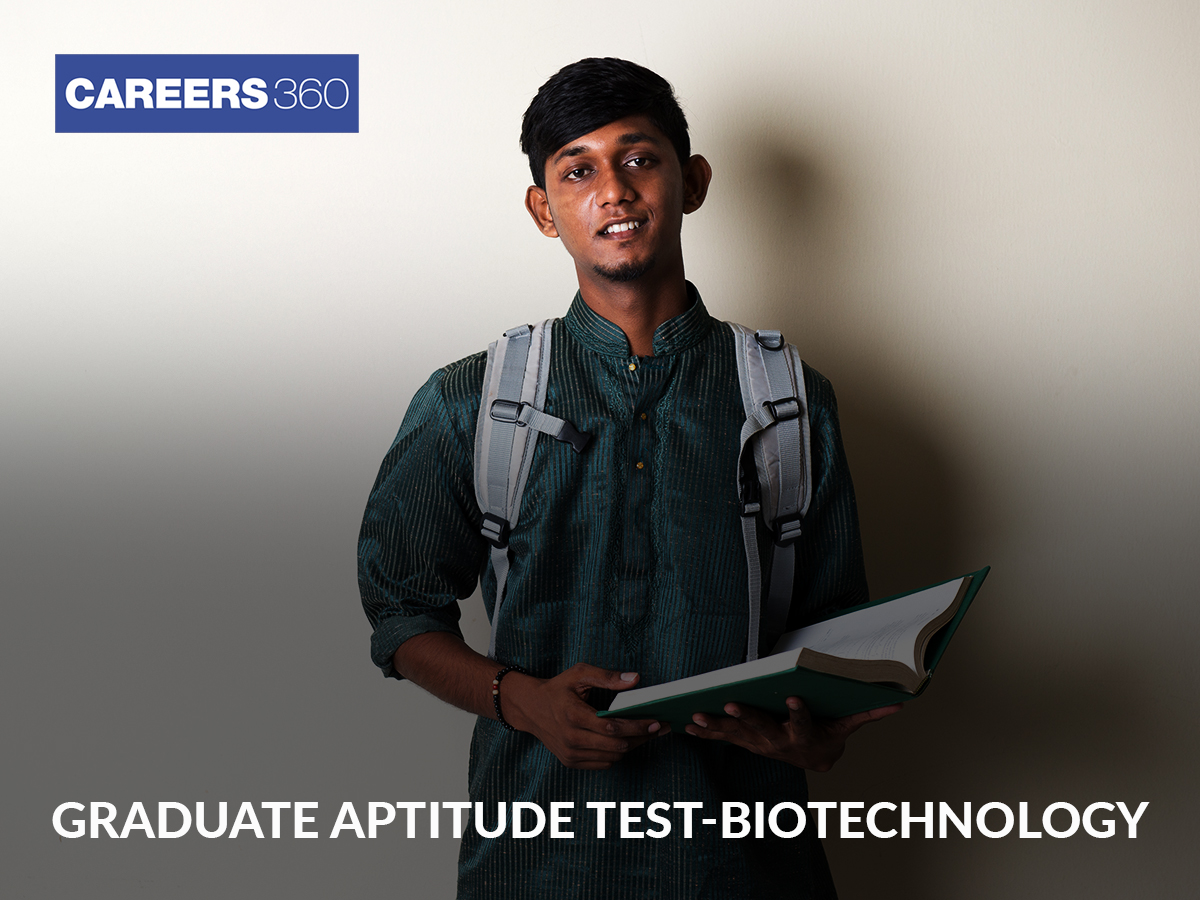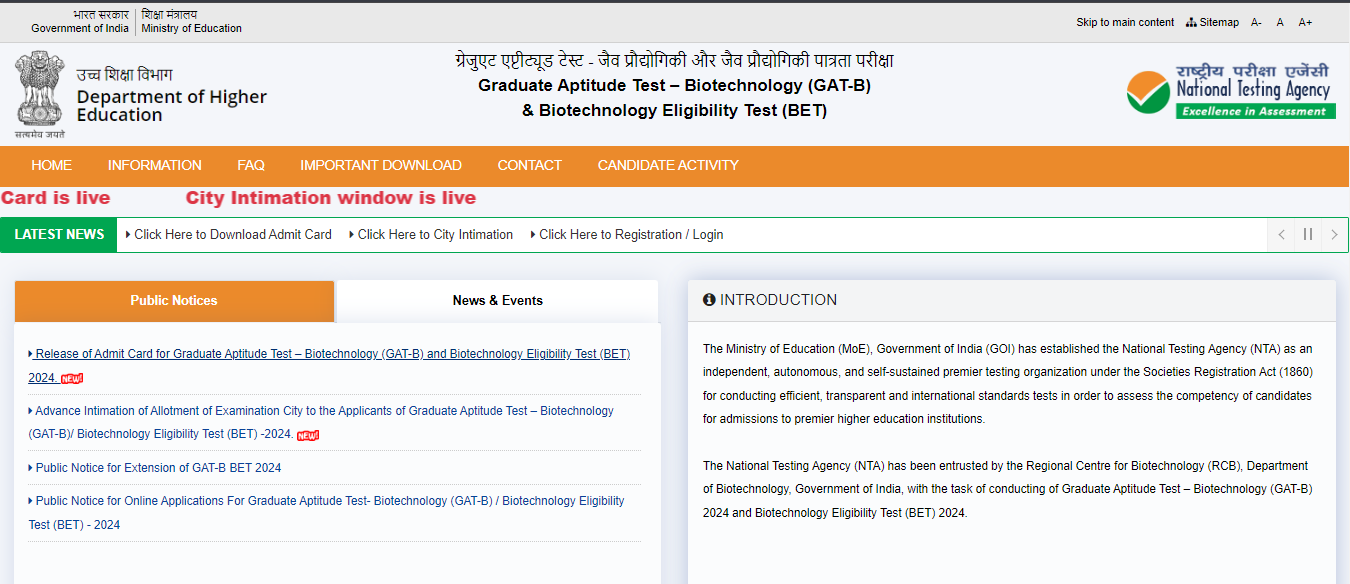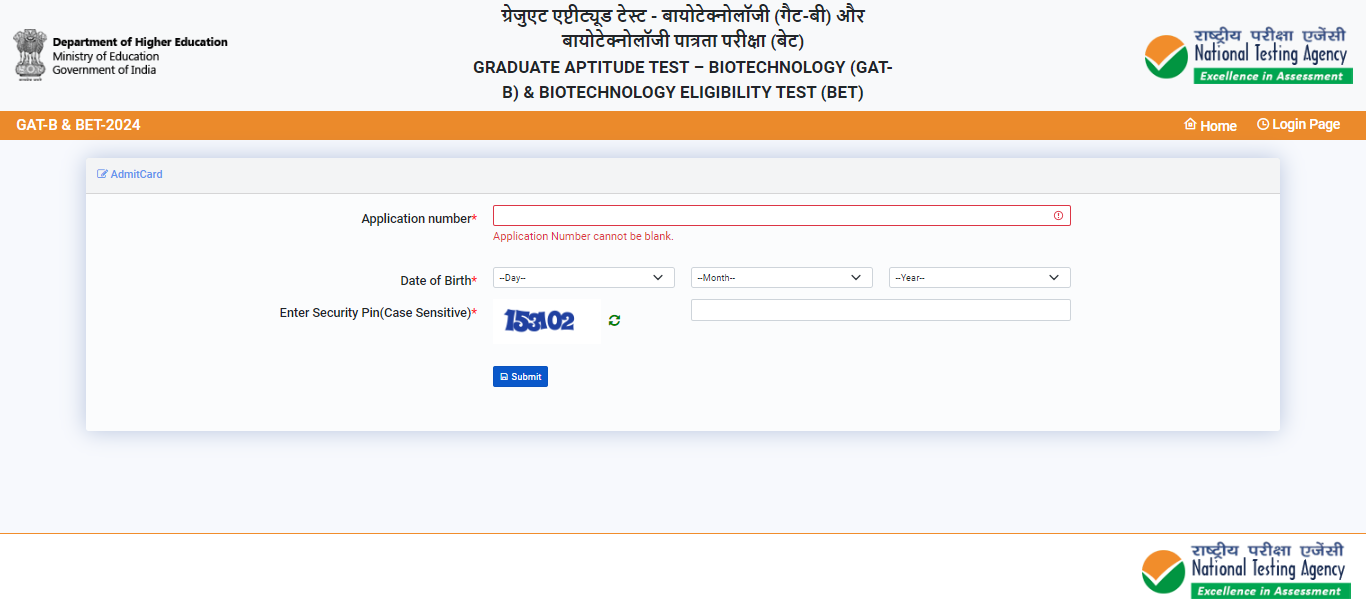VIT Chennai Int M.Sc. Applied Psychology Admissions 2026
VIT Chennai Integrated M.Sc Admissions Open 2026 | Cutting-Edge Infrastructure for Enhanced Learning | Expert Faculty
GAT-B 2026 - The National Testing Agency will start the GAT B application process in February at exams.nta.ac.in/DBT. Candidates have to check the GAT B eligibility criteria before starting the application process. Candidates have to fill and submit the GAT B application form 2026 before the deadline.
NTA will also provide the GAT-B correction facility for aspirants who made mistakes while filling out the application form. The GAT B admit card 2026 will be released in April. Aspirants who have filled the application form can download the GAT B 2026 hall ticket using their login credentials. The NTA will release the answer key of GAT B exam tentatively in April. NTA will also provide candidates to challenge the GAT B provisional answer key. The GAT B 2026 results will be announced in the form of a scorecard. After the declaration of the results the participating colleges will start the GAT B counselling for the shortlisted candidates.
Graduate Aptitude Test - Biotechnology is an all-India entrance test that grants admission to DBT-supported postgraduate programmes in biotechnology and allied programmes. There are 34 participating universities, including Jawaharlal Nehru University and SPPU in GAT B 2026. Candidates will be admitted in the participating universities based on the GAT-B scores. Aspirants have to go through the GAT B syllabus to ace the exam. The GAT-B entrance exam is conducted for a duration of three hours. Candidates who registered are eligible for the GAT-B 2026 exam. The admission process is done in the participating universities based on the GAT-B scores.
011 40759000

| Full Exam Name | Graduate Aptitude Test-Biotechnology |
| Short Exam Name | GAT-B |
| Conducting Body | Regional Centre for Biotechnology |
| Frequency Of Conduct | Once a year |
| Exam Level | National Level Exam |
| Languages | English |
| Mode Of Application | online |
| Application Fee | Online : 1300 |
| Mode Of Exam | online |
| Mode Of Counselling | online +1 more |
| Exam Duration | 3 Hours |
| No Of Seats | 1221 |
Candidates who registered for the GAT-B 2026 exam are required to go through the eligibility criteria before filling up the online application form. Candidates who do not meet the GAT-B eligibility criteria are not eligible for the GAT-B entrance test. GAT-B eligibility criteria is about the minimum age and academic qualification that a candidate must fulfill to be eligible to apply for the admission in various DBT supported programmes offered by the university.
Based on the GAT-B 2026 eligibility criteria for M.Tech programmes, candidates are required to have a B.Tech/BE degree in the respective stream with a minimum of 60% (General, EWS & OBC category) or 55% (SC,ST & PwD) aggregate by the participating university.
Only those candidates are eligible for admission to M.Sc programmes, who have completed their graduation in 10+2+3 pattern in the respective field with a minimum of 60% (General, EWS & OBC category) or 55% (SC,ST & PwD) aggregate from a recognized university.
According to the GAT-B 2026 eligibility criteria of M.VSc Animal Biotechnology programme, candidates must have a B.V.Sc. & A.H. degree or an equivalent degree from a recognized university with a minimum CGPA of 6.60 in 10.00 scale or 2.60 on a 4.00 scale or 60% marks in the traditional system. Candidates belonging to reserved categories (SC/ST) are required to have a 5.60 on 10.00 scale, 2.20 on 4.00 scale, and 50% marks.
NTA will start the GAT-B 2026 application process in February. Students should register for the GAT B exam before the deadline. Candidates who want to get admitted in M.Sc. Biotechnology and allied programmes in the participating universities were required to fill and submit the NTA GAT-B 2026 application form for the participating universities. Candidates are required to check the GAT B eligibility criteria before submitting the application form. The application fee for general category is Rs/- 1300 and Rs/- 650 for SC, ST, EWS and PwD categories. Candidates can know more about the GAT-B application form and steps to fill the application form below.
Email ID.
Phone number.
Personal details.
Qualifying exam mark sheets.
Applicable certificates to upload.
Scanned images of your recent passport photo and signature (as per guidelines).
Step 1 - Students have to register themselves by visiting the official website - dbt.nta.ac.in.
Step 2 - After registration, candidates can start filling in the required details in the GAT-B application form.
Step 3 – Upload all the required documents which include educational certificates, scanned signature, and recent passport size photograph.
Step 4 – Preview the GAT-B application form 2026 carefully to make sure all the details are correct.
Step 5 – Click on payment mode - Credit Card/Debit Card/Net Banking and pay the application fee for GAT-B 2026.
The GAT-B exam pattern 2026 can help students to understand the concept of the GAT-B exam. The exam pattern consists of details regarding exam mode, marking scheme, types of questions ask Students could submit their applications before the GAT-B 2026 application form last date. The GAT-B 2026 registrations are not allowed beyond the deadline, marking scheme and the medium of the NTA GAT B exam. According to the GAT-B 2026 exam pattern, every correct response carries three marks and every incorrect response gets deducted by one mark. The total number of question papers in GAT-B consists of 100 mCQs and the candidates are required to attempt atleast 60 questions. Candidates are required to go through the exam pattern before appearing for the GAT-B exam.
Particulars | Details |
Mode of exam | Online (CBT) |
Time duration | 3 hours (180 minutes) |
Total Sections | 2 (A and B) |
Type of questions | Multiple choice (MCQs) |
Part A | 60 compulsory questions 1 marks for each correct answer Negative marking of ½ marks for each incorrect answer |
Part B | 60 questions to be attempted out of 100 3 marks for each correct answer Negative marking of -1 marks for each incorrect answer |
Basic biology, life sciences, biotechnology and allied area: Unit 01
Basic biology, life sciences, biotechnology and allied area: Unit 02
Basic biology, life sciences, biotechnology and allied area: Unit 03
Basic biology, life sciences, biotechnology and allied area: Unit 04
Basic biology, life sciences, biotechnology and allied area: Unit 05
Basic biology, life sciences, biotechnology and allied area: Unit 06
Basic biology, life sciences, biotechnology and allied area: Unit 07
Basic biology, life sciences, biotechnology and allied area: Unit 08
Basic biology, life sciences, biotechnology and allied area: Unit 09
Basic biology, life sciences, biotechnology and allied area: Unit 10
Basic biology, life sciences, biotechnology and allied area: Unit 11
Basic biology, life sciences, biotechnology and allied area: Unit 12
Basic biology, life sciences, biotechnology and allied area: Unit 13
The National Testing Agency will issue GAT-B admit card 2026 in April at exams.nta.ac.in/DBT/. Candidates will be able to download the GAT B hall ticket from the official website by using their login credentials. The GAT-B admit card 2026 contains information about the name of the candidate, exam centre, name of the exam, photograph of the candidate, reporting time and signature of the candidate. If the candidates have any false information or any other issue regarding the admit card, then they should contact the officials as early as possible to make the correction before the exam. Candidates are required to carry a valid ID proof such as Aadhar card/PAN card/Driving licence/Voter ID/Passport along with the admit card to the examination centre.
 Enter your login details such as application number, date of birth and security PIN.
Enter your login details such as application number, date of birth and security PIN.
The NTA will release the GAT-B answer key in April on its official website. Candidates who have attempted the GAT-B exam can check the answer key at exams.nta.ac.in/DBT/. NTA will release the GAT-B 2026 answer key in two ways like provisional and final. Aspirants who are not satisfied with the answer key can challenge the GAT-B 2026 provisional answer key within a stipulated time. NTA will release the GAT-B final answer key based on the objections raised by the candidates.
Visit the official website of GAT-B 2026 - exams.nta.ac.in/DBT/.
You will be redirected to the home page
Fill in your 'GAT B Application ID & Date of Birth'
Then, click on the 'Login button'.
CUET answer key download window will be displayed in form of 'PDF' on the computer screen
Download the GAT B answer key 2026 pdf.
Students need to download it and keep it for future reference.
The National Testing Agency will announce the GAT B result 2026 in June at exams.nta.ac.in/DBT/. Candidates can check their result by logging in with the application number and password or date of birth. The participating universities will release the waiting list based on the GAT- B 2026 scores. The waiting list will be prepared based on the rank secured by the candidates in the GAT-B 2026 exam.
The National Testing Agency will release the GAT-B scorecards along with the rank cards. Candidates who appeared for the exam can download the GAT-B scorecard by using their login credentials on the official website - exams.nta.ac.in/DBT/.
Visit the official website — exams.nta.ac.in/DBT/.
Click on the “GAT-B Score Card & Rank Card” tab.
Click on “Login with application number and password” and enter the application number, password and security code to login.
Click on “Login with application number and date of birth” and enter the application number, date of birth and security pin to login.
Your GAT-B 2026 scorecard will be displayed on the screen.
Download GAT B scorecard 2026 and take a print of it for future reference.
Contact Number:
01140759000
Relevant Links:
Official Website Link Click HereFrequently Asked Questions (FAQs)
Candidates can make the GAT-B 2026 application fee payment online by using credit card / debit card/ net banking / UPI.
There is no age limit to apply for the GAT-B exam 2026.
GAT-B examination 2026 will be conducted in English language.
Candidates can download the GAT-B 2026 admit card from the official website by using their login credentials.
Candidates can find their allotted GAT-B 2026 exam centre on the admit card.
The National Testing Agency will start the GAT-B registration 2026 in February.
The GAT-B exam 2026 will be held in April.
The National Testing Agency will open the GAT-B 2026 application correction window in March. Applicants can make changes in the GAT-B 2026 correction window before the deadline.
Candidates can apply for GAT-B 2026 exam by visiting the official website at exams.nta.ac.in/DBT/.
GAT-B stands for Graduate Aptitude Test for Biotechnology and other allied programmes. GAT-B is a national level entrance examination conducted by the National Testing Agency (NTA).
On Question asked by student community
Hello,
As per the information available in GAT-B 2022 Information Brochure the schedule official date for the Display of Recorded Responses and Provisional Answer Keys on the Website is yet to be announced. The official date will be announced shortly so please wait until then. Please keep an eye on
Hello Aspirant.
Hope you are doing well.
Really sorry, but your question is not quite clear as you have not mentioned the name of the exam for which you have asked the query so please kindly mention the name of the exam for which you are asking the question so
Dear Student,
You can start your preparation whenever you want to. Just remember one thing, revision is a must. You must do revise the topic once in a week, once in two weeks and once in a month. This will help to remember the topic more.
Tips you can follow
Master's programs in Sustainability Science and Practice; Climate Change Science and Practice; Urban Economic and Infrastructure Development; Human Development Policy and Practice
NAAC A+ Accredited | Among top 2% Universities Globally (QS World University Rankings 2026)
Highest CTC 30 LPA | #9 in Management Category by Times B-School | Merit-Based Scholarship Upto - 50 Crores
Among top 100 Universities Globally in the Times Higher Education (THE) Interdisciplinary Science Rankings 2026
Last Date to Apply: 25th Feb | Ranked #45 Among Universities in India by NIRF | 1950+ Students Placed 91% Placement, 800+ Recruiters
MSc Finance and MSc International Management Admissions 2026 Now Open | Ranked Among the Top 100 Universities in the World by QS World University Rankings 2025 | Early Round 2 Applications Deadline: 29th Jan’26